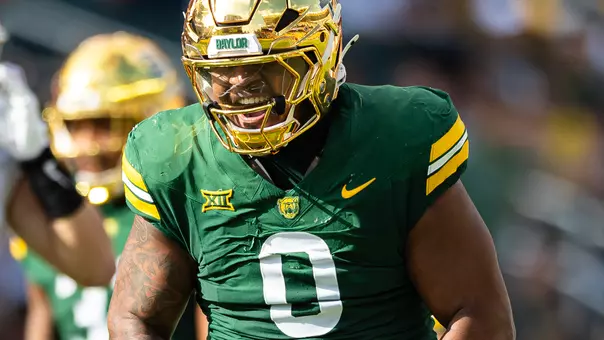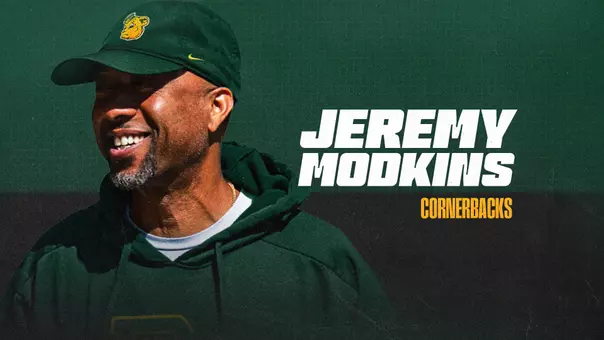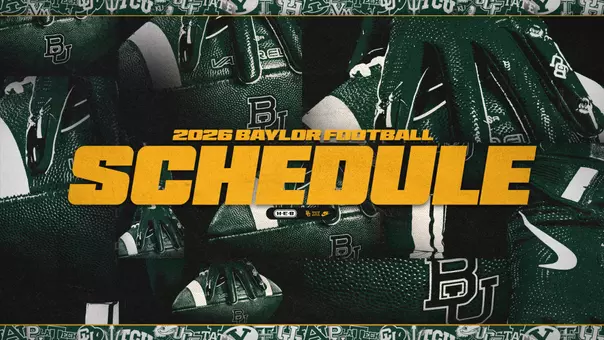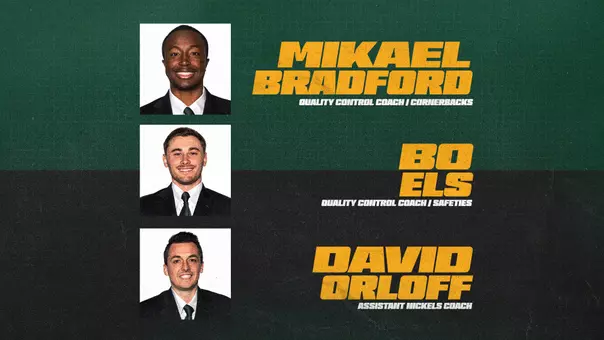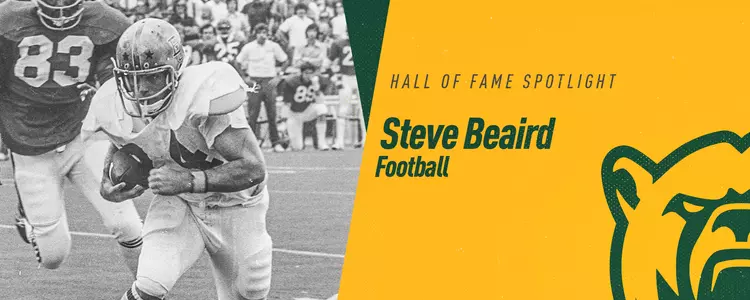
YOU CAN’T HAVE ONE WITHOUT THE OTHER
11/15/2019 9:27:00 AM | Football, General
Hall of Famer Beaird Credits Pat McNeil for ‘Doing All the Work’
(Editor's note: This is the ninth in a series of feature profiles on this year's Hall of Fame and Wall of Honor selections that will be posted every Thursday, leading up to the Nov. 22 Hall of Fame banquet.)
By Jerry Hill
Baylor Bear Insider
Steve Beaird disputes that he's the first 1,000-yard rusher in Baylor football program history. Even if it's right there in black and white, in the media almanac – he rushed for 1,104 yards and 13 touchdowns on 267 carries for the 1974 Southwest Conference champions.
"The answer is half true. The other half of that answer is no," said Beaird, part of the 2019 class for the Baylor Athletics Hall of Fame that will be inducted next Friday, Nov. 22. "Who was the first 1,000-yard rusher in Baylor history? Pat McNeil and Steve Beaird. Truly, you can't have one without the other. That's just the way it is. And that's the way it was in 1974."
Arguably one of Baylor's best backfield duos ever, Beaird and McNeil rushed for a combined 1,563 yards and 16 touchdowns during that magical '74 season when the Bears went from last-to-first in the SWC and won their first conference title in 50 years.
"He blocked for me more than I blocked for him, but he was a good running back," Beaird said of McNeil, a 5-10, 210-pound fullback. "I just happened to be playing a position where if we got down on the goal line, two or three yards to go, they gave me the ball. He did all the work, I just followed behind him, but I got all the ink."
That goes step-for-step with Beaird's feelings about getting into the Hall of Fame 45 years after his last game at Baylor. He's honored, he's humbled, but "honestly, I feel like I should not get 100 percent of the credit when I only did 50 percent of the work. I feel like Pat McNeil should be getting this award because we were a duo."
An all-state running back at Angleton High School, the 5-foot-7, 195-pound Beaird got all of one scholarship offer – from Blinn Junior College coach Leroy Dreyer.
"I'll never forget this, coach Mickey Sullivan from Baylor University came to Angleton and asked the coaches if there were any kids worth looking at," Beaird said. "I was one of them that Coach (Fred) Johnson pointed out. They called me over to talk to Coach Sullivan. He looked me up and down and said, 'Boy, I know you're pretty good, but you're just a little too small. We can't use you.'''
At the University of Houston, in his own back yard, one of Bill Yeoman's assistants gave him the same assessment.
An all-conference and All-American pick for an undefeated Blinn team in 1972, Beaird's scholarship offers went from one to 60. He chose Baylor after hearing legendary head coach Grant Teaff speak at a Brenham High School banquet where one of the honorees was future Baylor teammate Cleveland Franklin.
"I was sold," Beaird said. "I told Coach Teaff, I shook his hand, and said it would be an honor to play for him. Let me tell you, that was probably the best decision I ever made, not because of football but because of what I learned from Coach Teaff as a life coach. . . . I hung on every word he said, and I still use things today that he taught me back then."
As a junior in '73, Beaird barely saw the field until the 10th week of the season, when he rushed for a then school-record 176 yards on 28 carries in a 38-22 loss to SMU. Starting the last two games, he rushed for 274 yards and one touchdown on 46 attempts.
"That year, they decided I needed to ride the bench," said Beard, who was still the team's second-leading rusher behind senior Gary Lacy with 345 yards and two TDs on 68 totes.
It was the next year when Beaird and McNeil came into their own. After a 2-9 finish in '73, the Bears won the Southwest Conference championship, finished 8-4 and lost to Penn State, 41-20, in their first-ever Cotton Bowl appearance.
Much like Matt Rhule promising that a 1-11 Baylor team would be in a bowl game the next year, Teaff had stood up before that 2-9 team in 1973 and "mapped out our season and how we were going to win," Beaird said.
"I thought the man was crazy," Beaird said. "But, he had a vision. And he got all of his players to play at their highest level. You take a 5-star athlete. If he only plays up to four stars, he hasn't reached his full potential. But, you take a bunch of 3-star athletes like we were, he could get us to play like 5-star athletes because he got every ounce out of it. That's why I consider him such a life coach."
A unanimous all-conference pick who was named the league's MVP by the Houston Post, Beaird was drafted by the St. Louis Cardinals in the seventh round of the 1975 NFL Draft. When he felt like the Cardinals low-balled him with their offer, Beaird instead signed with the Winnipeg Blue Bombers of the Canadian Football League.
Twenty minutes after agreeing to sign with Winnipeg general manager Earl Lunsford for "quite a bit more on the signing bonus and a whole lot more on my regular contract" than the St. Louis offer, Beaird got a call from the Cardinals.
"They said they were going to give me what I wanted, we think you're worth it," he said. "And I told them, 'No, sir, I gave my word, I can't go back on it. I'm going to Winnipeg.'''
In two seasons with the Blue Bombers, Beaird rushed for 1,367 yards, caught 51 passes for 584 yards, scored 16 touchdowns and had another 1,372 yards in kick and punt returns. A CFL all-star after his second season, Beaird walked away from a three-year contract that would have paid him over $100,000.
"I never went back to play because I just figured I wanted to get on and make a living doing something besides playing ball," he said, "because I was playing for a paycheck and not from the heart. It just wasn't in my heart. I started every game in those two years, never sat on the bench and just walked away."
After a couple years of "searching for some pie-in-the-sky stuff," Beaird went into the construction business and ended up starting Beaird Drilling that is now based in Fentress, Texas, just outside of San Marcos.
"I went from one rig that could drill 20 feet deep and cost me $50,000," he said. "And now, I think we've got maybe 16 to 20 rigs, and they're anywhere from $400,000 to $750,000 rigs. My boys are running it. I hadn't worked in about two years because I had liver cancer and had two surgeries, but I'm back up and running now."
Steve and his wife, Meda, have three sons, Steve, Mitch and Stewart, and moved back to Teague, Texas, about a year ago.
"We bought the country club over there at Teague (Tri-City Golf Club) about three years ago, and I figured I was just going to retire and play golf and take it easy," he said. "And here I am in San Antonio, working for my boys, just trying to help them out."
Joining Beaird in the 2019 Hall of Fame class are fellow football players John Adickes and Robin Jones, All-Americans Lauren Hagans Paquette from women's track and Ryan Baca from men's golf, softball's Lisa Ferguson Murphy, baseball's Josh Ford and professional basketball player Curtis Jerrells. Additionally, Mark Hurd (posthumously) and Jody Conradt will be added to the Wall of Honor.
The Baylor Athletics Hall of Fame banquet will be held at 6:30 p.m. Friday, Nov. 22, in the Brazos Room at the Waco Convention Center. Tickets cost $50 per person, with table sponsorships also available for $600 (green) and $800 (gold), and can be purchased by contacting the "B" Association at 254-710-3045 or by email at Tammy_Hardin@baylor.edu.
By Jerry Hill
Baylor Bear Insider
Steve Beaird disputes that he's the first 1,000-yard rusher in Baylor football program history. Even if it's right there in black and white, in the media almanac – he rushed for 1,104 yards and 13 touchdowns on 267 carries for the 1974 Southwest Conference champions.
"The answer is half true. The other half of that answer is no," said Beaird, part of the 2019 class for the Baylor Athletics Hall of Fame that will be inducted next Friday, Nov. 22. "Who was the first 1,000-yard rusher in Baylor history? Pat McNeil and Steve Beaird. Truly, you can't have one without the other. That's just the way it is. And that's the way it was in 1974."
Arguably one of Baylor's best backfield duos ever, Beaird and McNeil rushed for a combined 1,563 yards and 16 touchdowns during that magical '74 season when the Bears went from last-to-first in the SWC and won their first conference title in 50 years.
"He blocked for me more than I blocked for him, but he was a good running back," Beaird said of McNeil, a 5-10, 210-pound fullback. "I just happened to be playing a position where if we got down on the goal line, two or three yards to go, they gave me the ball. He did all the work, I just followed behind him, but I got all the ink."
That goes step-for-step with Beaird's feelings about getting into the Hall of Fame 45 years after his last game at Baylor. He's honored, he's humbled, but "honestly, I feel like I should not get 100 percent of the credit when I only did 50 percent of the work. I feel like Pat McNeil should be getting this award because we were a duo."
An all-state running back at Angleton High School, the 5-foot-7, 195-pound Beaird got all of one scholarship offer – from Blinn Junior College coach Leroy Dreyer.
"I'll never forget this, coach Mickey Sullivan from Baylor University came to Angleton and asked the coaches if there were any kids worth looking at," Beaird said. "I was one of them that Coach (Fred) Johnson pointed out. They called me over to talk to Coach Sullivan. He looked me up and down and said, 'Boy, I know you're pretty good, but you're just a little too small. We can't use you.'''
At the University of Houston, in his own back yard, one of Bill Yeoman's assistants gave him the same assessment.
An all-conference and All-American pick for an undefeated Blinn team in 1972, Beaird's scholarship offers went from one to 60. He chose Baylor after hearing legendary head coach Grant Teaff speak at a Brenham High School banquet where one of the honorees was future Baylor teammate Cleveland Franklin.
"I was sold," Beaird said. "I told Coach Teaff, I shook his hand, and said it would be an honor to play for him. Let me tell you, that was probably the best decision I ever made, not because of football but because of what I learned from Coach Teaff as a life coach. . . . I hung on every word he said, and I still use things today that he taught me back then."
As a junior in '73, Beaird barely saw the field until the 10th week of the season, when he rushed for a then school-record 176 yards on 28 carries in a 38-22 loss to SMU. Starting the last two games, he rushed for 274 yards and one touchdown on 46 attempts.
"That year, they decided I needed to ride the bench," said Beard, who was still the team's second-leading rusher behind senior Gary Lacy with 345 yards and two TDs on 68 totes.
It was the next year when Beaird and McNeil came into their own. After a 2-9 finish in '73, the Bears won the Southwest Conference championship, finished 8-4 and lost to Penn State, 41-20, in their first-ever Cotton Bowl appearance.
Much like Matt Rhule promising that a 1-11 Baylor team would be in a bowl game the next year, Teaff had stood up before that 2-9 team in 1973 and "mapped out our season and how we were going to win," Beaird said.
"I thought the man was crazy," Beaird said. "But, he had a vision. And he got all of his players to play at their highest level. You take a 5-star athlete. If he only plays up to four stars, he hasn't reached his full potential. But, you take a bunch of 3-star athletes like we were, he could get us to play like 5-star athletes because he got every ounce out of it. That's why I consider him such a life coach."
A unanimous all-conference pick who was named the league's MVP by the Houston Post, Beaird was drafted by the St. Louis Cardinals in the seventh round of the 1975 NFL Draft. When he felt like the Cardinals low-balled him with their offer, Beaird instead signed with the Winnipeg Blue Bombers of the Canadian Football League.
Twenty minutes after agreeing to sign with Winnipeg general manager Earl Lunsford for "quite a bit more on the signing bonus and a whole lot more on my regular contract" than the St. Louis offer, Beaird got a call from the Cardinals.
"They said they were going to give me what I wanted, we think you're worth it," he said. "And I told them, 'No, sir, I gave my word, I can't go back on it. I'm going to Winnipeg.'''
In two seasons with the Blue Bombers, Beaird rushed for 1,367 yards, caught 51 passes for 584 yards, scored 16 touchdowns and had another 1,372 yards in kick and punt returns. A CFL all-star after his second season, Beaird walked away from a three-year contract that would have paid him over $100,000.
"I never went back to play because I just figured I wanted to get on and make a living doing something besides playing ball," he said, "because I was playing for a paycheck and not from the heart. It just wasn't in my heart. I started every game in those two years, never sat on the bench and just walked away."
After a couple years of "searching for some pie-in-the-sky stuff," Beaird went into the construction business and ended up starting Beaird Drilling that is now based in Fentress, Texas, just outside of San Marcos.
"I went from one rig that could drill 20 feet deep and cost me $50,000," he said. "And now, I think we've got maybe 16 to 20 rigs, and they're anywhere from $400,000 to $750,000 rigs. My boys are running it. I hadn't worked in about two years because I had liver cancer and had two surgeries, but I'm back up and running now."
Steve and his wife, Meda, have three sons, Steve, Mitch and Stewart, and moved back to Teague, Texas, about a year ago.
"We bought the country club over there at Teague (Tri-City Golf Club) about three years ago, and I figured I was just going to retire and play golf and take it easy," he said. "And here I am in San Antonio, working for my boys, just trying to help them out."
Joining Beaird in the 2019 Hall of Fame class are fellow football players John Adickes and Robin Jones, All-Americans Lauren Hagans Paquette from women's track and Ryan Baca from men's golf, softball's Lisa Ferguson Murphy, baseball's Josh Ford and professional basketball player Curtis Jerrells. Additionally, Mark Hurd (posthumously) and Jody Conradt will be added to the Wall of Honor.
The Baylor Athletics Hall of Fame banquet will be held at 6:30 p.m. Friday, Nov. 22, in the Brazos Room at the Waco Convention Center. Tickets cost $50 per person, with table sponsorships also available for $600 (green) and $800 (gold), and can be purchased by contacting the "B" Association at 254-710-3045 or by email at Tammy_Hardin@baylor.edu.
Baylor Basketball (W): Postgame at UCF | February 15, 2026
Sunday, February 15
Baylor Baseball: Highlights vs. New Mexico State | February 15, 2026
Sunday, February 15
Baylor Basketball (W): Kayla Nelms (12 PTS) at UCF | February 15, 2026
Sunday, February 15
Baylor Basketball (W): Darianna Littlepage-Buggs (10 PTS) at UCF | February 15, 2026
Sunday, February 15
